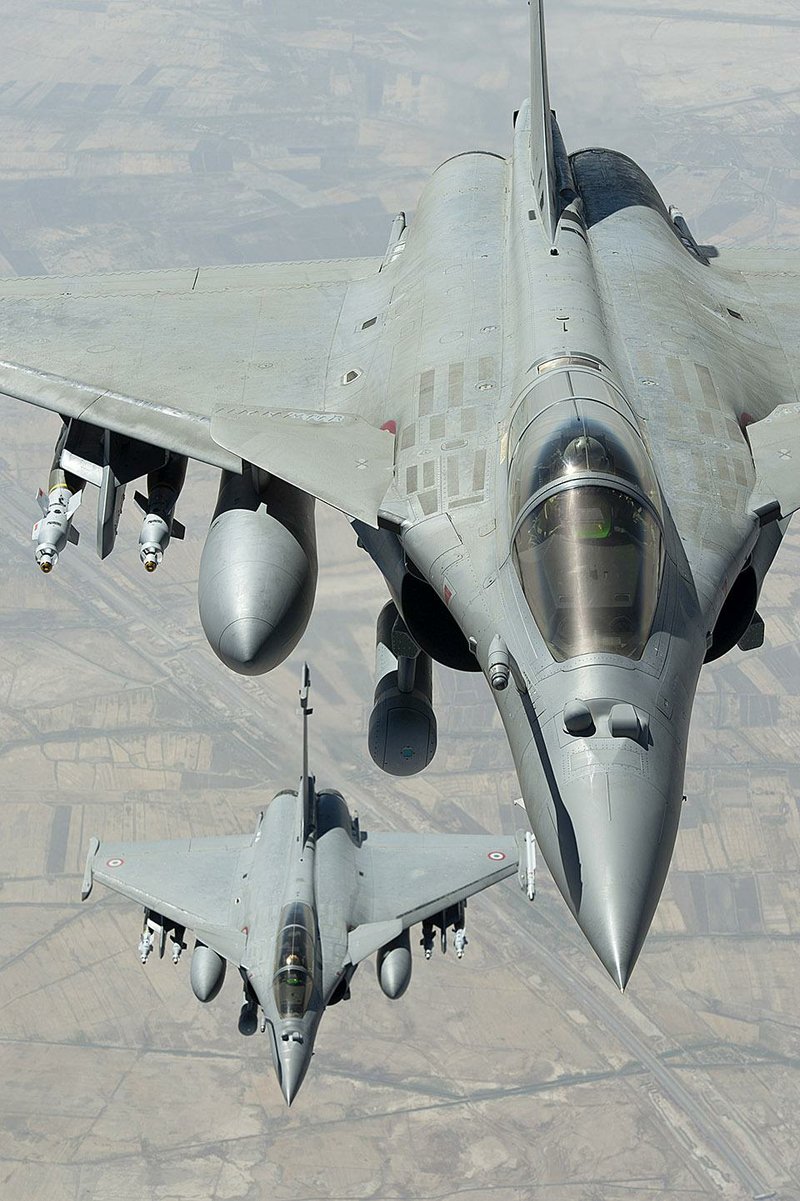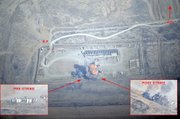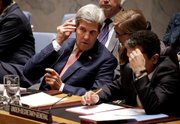PARIS -- French fighter jets embarked on their first airstrikes against militants of the Islamic State, President Francois Hollande said Friday, one day after he pledged to join the United States in its offensive against the group in Iraq.
RELATED ARTICLES
http://www.arkansas…">U.S. goal: Train 5,000 rebels, have them fight Islamic Statehttp://www.arkansas…">Syria declares it was ricin maker
Also Friday, several thousand Syrians, most of them Kurds, crossed into Turkey to find refuge from Islamic State militants who had barreled through dozens of Kurdish villages in northern Syria in the past 48 hours. The Islamic State controls a large swath of Syria and north and western Iraq.
Rafale planes struck a logistics depot belonging to the extremist group in northeastern Iraq, Hollande said in a statement.
"The objective was hit and entirely destroyed," it said, adding that other operations would take place in the coming days.
Remarking on the violent tactics employed by the Sunni militants, Hollande said Thursday at a news conference in Paris that the group had been able to grow partly because the international community had failed to intervene. But he emphasized that France's role would be limited to providing air support, including strikes, in Iraq.
He indicated that France would not expand its mission into Syria, and French officials have made it clear that the government does not want to give the impression that it supports the Syrian government led by President Bashar Assad.
Hollande said France is operating independently in Iraq, based on a request for airstrikes from Baghdad and in coordination with its allies. The U.S. Central Command said Thursday that the U.S. military has conducted 176 airstrikes in Iraq since Aug. 8.
France was among the most vocal critics of President George W. Bush's decision to conduct Iraqi military action in 2003 that toppled Saddam Hussein. But Hollande has framed the fight against the Islamic State as important for French national security. The group has become a lure for jihad-minded youths from France, elsewhere in Europe, and beyond.
An Iraqi military spokesman said Friday that dozens of extremist fighters were killed in the French strikes. A French military official said a damage assessment had not been completed.
Other such operations in Iraq will continue in coming days, Hollande said, "with the same goal -- to weaken this terrorist organization and come to the aid of the Iraqi authorities."
As the U.S. also continues airstrikes to fight the Islamic State, the Army's top officer warned Friday that it will become increasingly difficult to target and launch precision airstrikes against Islamic State militants hiding among the Iraqi population.
Army Chief of Staff Gen. Ray Odierno said that so far the targets hit in Iraq have largely been out in the open and were "clearly identifiable." Now, he said, the militant fighters are starting to infiltrate the population, and there are reports that they are using children and others as shields.
He said that in order for the U.S. to maintain the precision of the strikes, Iraqi or other ground troops may be needed to better direct them.
The influential Shiite cleric Grand Ayatollah Ali al-Husseini al-Sistani on Friday urged vigilance against Western political interference in Iraqi affairs but stopped short of opposing the U.S.-led military campaign against the Islamic State.
"All political leaders of the country must be aware and awake to prevent the external assistance against the Islamic State from becoming an entrance to breach Iraq's independence," al-Sistani said. "Cooperation with the international effort shall not be taken as a pretext to impose foreign decisions on events in Iraq, especially military events."
Meanwhile, a series of vehicle bombings in Iraq killed at least 31 people Friday, officials said, in the second straight day of attacks in Baghdad blamed on the Islamic State.
U.N.: 'Deep Outrage'
The United Nations Security Council urged the international community Friday to expand support for the Iraqi government as it fights the Islamic State and its allies, and U.S. Secretary of State John Kerry said there is a role for nearly every country in the world -- including Iran.
The presidential statement approved by all 15 council members at a meeting chaired by Kerry expressed "deep outrage" at the killing, kidnapping, rape and torture carried out by the Islamic State group. Some of those acts might constitute war crimes and crimes against humanity, it said.
Kerry convened the council to show support for the new Iraqi government in its efforts to combat the Islamic State and to mobilize the world against the extremists.
He did so a day after Congress approved the Obama administration's plan authorizing the U.S. military to arm and train moderate Syrian rebels fighting Islamic State militants. President Barack Obama signed that legislation into law Friday.
"If left unchecked, these terrorists certainly would pose a growing threat beyond the region because they have already promised it," Kerry said.
Nikolay Mladenov, the U.N.'s top envoy in Iraq, said the U.N. estimates that since January there have been at least 25,000 civilian casualties including at least 8,500 killed and more than 16,000 wounded. Since the beginning of June, when Islamic State fighters swept from Syria into Iraq, he said at least 4,700 civilians have been killed and some 6,500 wounded, he said.
Minority groups including Christians, Yezidis, Shabaks, Turkmens and others have been targeted by Islamic State fighters deliberately cleansing territories under their control, perpetrating crimes that may also amount to genocide, Mladenov said.
Obama also will call on world leaders next week to back a U.N. resolution calling on nations to stem the flow of foreign fighters joining terrorist organizations like the Islamic State, as the U.S. seeks to build legitimacy for its military campaign in Iraq and Syria, the White House said Friday.
Obama's national security adviser, Susan Rice, said she expects unanimous approval in the U.N. Security Council for a resolution obligating member states to "prevent and deter" their citizens from traveling to war zones to join extremist groups. The resolution falls under Chapter 7 of the U.N. Charter, meaning it can be enforced militarily.
Although the resolution doesn't authorize the U.S. military campaign against the Islamic State, it could bolster the president's argument that there's broad international support for the effort.
"It will move the ball down the field in terms of the international legal architecture and obligations on states to try to combat this challenge," Rice said of the resolution.
Syrian Kurds' Warning
The extremists' offensive this week in the Kobani area of Syria, near the border with Turkey, prompted the leader of Iraq's Kurdish region Friday to urge the international community to intervene to save Syria's Kurds as thousands of people fled across the border.
In a statement posted on his website, the president of Iraq's largely autonomous Kurdish region, Masoud Barzani, said the Islamic State group's "barbaric and terrorist acts" in the Kobani area "threaten the whole entirety of the Kurdish nation and it has targeted the honor, dignity and existence of our people."
"The ISIS terrorists perpetrate crimes and tragedies wherever they are, therefore they have to be hit and defeated wherever they are," Barzani said, using an alternate name for the group.
By basing his appeal on humanitarian grounds, Barzani appeared to by trying to call for airstrikes similar to ones the U.S. military conducted in Iraq to help Kurdish security forces and protect religious minorities such as the Yazidi community.
But unlike their Iraqi brethren, Syria's Kurds have been left on their own in the fight against the Islamic State, and it is unclear whether the U.S. would be willing to meet Barzani's request.
The main Kurdish force in Syria, known as the People's Protection Units, has been battling the Islamic State group for more than a year. But the People's Protection Units is still viewed with suspicion by mainstream Syrian rebels and their Western supporters because of perceived links to Assad's government.
NATO member Turkey is also wary of the group, which it believes is affiliated with the Kurdish PKK movement that waged a long and bloody insurgency in southeast Turkey.
The Syrian Kurds who are now fleeing to Turkey are escaping an Islamic State onslaught that has captured more than 20 villages in the Kobani area since Wednesday, sending civilians streaming toward the frontier.
"Our house was destroyed. We have no family, no property left. We have nothing now. Everything is gone," said Ibrahim Halil, a Syrian Kurd who had just arrived in the Turkish village of Dikmetas in Sanliurfa province.
Halil was among some 3,000 people who entered Turkey on Friday. Many of those who crossed the border had been waiting at the frontier for 24 hours after Turkey, which is already home to nearly 850,000 registered Syrian refugees, refused to let them in Thursday.
But on Friday, Turkey decided to let them enter the country after reports emerged that militants were closing in on their communities, said Izzettin Kucuk, the governor of Turkey's Sanliurfa province.
Turkish Prime Minister Ahmet Davutoglu said Ankara's priority is to help those in need on the Syrian side of the border, but "if that's not possible then of course they will be given help" inside Turkey.
The battle over Kobani is part of a long-running fight between the Islamic State group and Syria's Kurds that has raged across several areas of northern Syria where large Kurdish populations reside. The clashes are but one aspect of Syria's broader civil war -- a multilayered conflict that the U.N. says has killed more than 190,000.
Information for this article was contributed by Dan Bilefsky, David D. Kirkpatrick, Dan Bilefsky, Kirk Semple, Omar Hikamt and Maia de la Baume of The New York Times; and by Ryan Lucas, Jamey Keaten, Sylvie Corbet, Robert Burns, Edith M. Lederer, Qassim Abdul-Zahra, Sameer N. Yacoub, Vivian Salama, Murtada Faraj, Imad Matti, Andrew Taylor, Trenton Daniel, Maria Sanminiatelli, Josh Lederman and staff members of The Associated Press.
A Section on 09/20/2014



